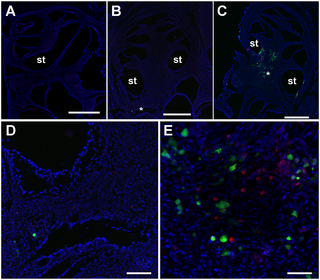PLoS Pathogens ( IF 5.5 ) Pub Date : 2017-08-31 , DOI: 10.1371/journal.ppat.1006599 Ali A. Almishaal , Pranav D. Mathur , Elaine Hillas , Liting Chen , Anne Zhang , Jun Yang , Yong Wang , Wayne M. Yokoyama , Matthew A. Firpo , Albert H. Park

|
Congenital cytomegalovirus (CMV) infection is the most common non-hereditary cause of sensorineural hearing loss (SNHL) yet the mechanisms of hearing loss remain obscure. Natural Killer (NK) cells play a critical role in regulating murine CMV infection via NK cell recognition of the Ly49H cell surface receptor of the viral-encoded m157 ligand expressed at the infected cell surface. This Ly49H NK receptor/m157 ligand interaction has been found to mediate host resistance to CMV in the spleen, and lung, but is much less effective in the liver, so it is not known if this interaction is important in the context of SNHL. Using a murine model for CMV-induced labyrinthitis, we have demonstrated that the Ly49H/m157 interaction mediates host resistance in the temporal bone. BALB/c mice, which lack functional Ly49H, inoculated with mCMV at post-natal day 3 developed profound hearing loss and significant outer hair cell loss by 28 days of life. In contrast, C57BL/6 mice, competent for the Ly49H/m157 interaction, had minimal hearing loss and attenuated outer hair cell loss with the same mCMV dose. Administration of Ly49H blocking antibody or inoculation with a mCMV viral strain deleted for the m157 gene rendered the previously resistant C57BL/6 mouse strain susceptible to hearing loss to a similar extent as the BALB/c mouse strain indicating a direct role of the Ly49H/m157 interaction in mCMV-dependent hearing loss. Additionally, NK cell recruitment to sites of infection was evident in the temporal bone of inoculated susceptible mouse strains. These results demonstrate participation of NK cells in protection from CMV-induced labyrinthitis and SNHL in mice.
中文翻译:

自然杀伤细胞减轻巨细胞病毒引起的小鼠听力损失
先天性巨细胞病毒(CMV)感染是感觉神经性听力损失(SNHL)的最常见的非遗传性原因,但听力丧失的机制仍然不清楚。通过杀伤细胞表面表达的病毒编码的m157配体的Ly49H细胞表面受体的NK细胞识别,自然杀伤(NK)细胞在调节鼠类CMV感染中起着关键作用。已发现这种Ly49H NK受体/ m157配体相互作用可介导宿主对脾脏和肺部CMV的抗性,但在肝脏中的有效性较差,因此尚不清楚这种相互作用在SNHL中是否重要。使用CMV诱导的迷路炎的鼠模型,我们已经证明Ly49H / m157相互作用介导颞骨中的宿主抵抗力。缺少功能性Ly49H的BALB / c小鼠,出生后第3天接受mCMV疫苗接种的人到28天后会出现严重的听力丧失和明显的外部毛细胞丧失。相反,在相同的mCMV剂量下,具有Ly49H / m157相互作用能力的C57BL / 6小鼠听力损失最小,外毛细胞损失减少。施用Ly49H阻断抗体或接种针对m157基因缺失的mCMV病毒株,使先前具有抗药性的C57BL / 6小鼠品系易感听力丧失,其程度与BALB / c小鼠品系相似,表明Ly49H / m157的直接作用依赖于mCMV的听力损失中的相互作用。另外,在已感染的易感小鼠品系的颞骨中明显可见NK细胞募集到感染部位。这些结果证明了NK细胞参与了对小鼠的CMV诱导的迷路炎和SNHL的保护。









































 京公网安备 11010802027423号
京公网安备 11010802027423号